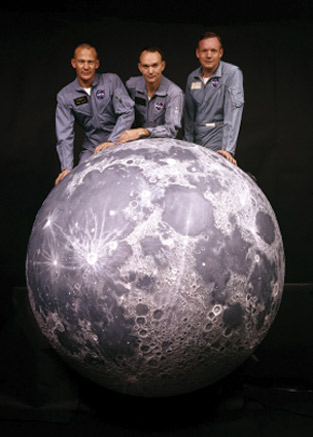TO PROMOTE ALLIANCES AMONG SPACE AGENCIES, ORGANIZATIONS AND COMPANIES, AS WELL AS PROFESSIONAL ADVOCATES FOR SPACE EXPLORATION AND DEVELOPMENT WORLDWIDE, TO ADVANCE THE DEVELOPMENT AND IMPLEMENTATION OF ROBOTIC AND SUSTAINABLE HUMAN SETTLEMENTS ON THE MOON, MARS AND BEYOND.
_____________________
Humankind has always dreamed about the Moon. From the earliest novels, such as Jules Verne's From Earth to the Moon (1865) and H.G. Wells' The First Men in the Moon (1901), to countless movies, television shows, and digital media currently playing worldwide, the Moon has served not only as a destination for space exploration and discovery, but also as a stepping stone to other planets throughout our solar system.
Humanity has climbed Earth's highest mountains, explored our deepest oceans, and sent humans to visit the Moon. But this is not where our dreams end, as we now seek to enable a sustainable return to the lunar surface - as a "stepping stone" to Mars and worlds beyond!
THE SPACE RACE
In 1955, the United States and the Soviet Union entered into the first major international space competition, pitting Capitalism versus Communism in a race to the Moon. In 1962, when President John Fitzgerald Kennedy announced our nation's goal to travel to the Moon before the end of the decade, he issued a challenge to inspire the American people to collectively embark on this journey.
"We choose to go to the Moon!", President Kennedy announced in Houston. "We choose to go to the Moon in this decade ... not because it is easy, but because it is hard - because that goal will serve to organize and measure the best of our energies and skills, because that challenge is one that we are willing to accept, one we are unwilling to postpone, and one we intend to win."
Humankind has always dreamed about the Moon. From the earliest novels, such as Jules Verne's From Earth to the Moon (1865) and H.G. Wells' The First Men in the Moon (1901), to countless movies, television shows, and digital media currently playing worldwide, the Moon has served not only as a destination for space exploration and discovery, but also as a stepping stone to other planets throughout our solar system.
Humanity has climbed Earth's highest mountains, explored our deepest oceans, and sent humans to visit the Moon. But this is not where our dreams end, as we now seek to enable a sustainable return to the lunar surface - as a "stepping stone" to Mars and worlds beyond!
THE SPACE RACE
In 1955, the United States and the Soviet Union entered into the first major international space competition, pitting Capitalism versus Communism in a race to the Moon. In 1962, when President John Fitzgerald Kennedy announced our nation's goal to travel to the Moon before the end of the decade, he issued a challenge to inspire the American people to collectively embark on this journey.
"We choose to go to the Moon!", President Kennedy announced in Houston. "We choose to go to the Moon in this decade ... not because it is easy, but because it is hard - because that goal will serve to organize and measure the best of our energies and skills, because that challenge is one that we are willing to accept, one we are unwilling to postpone, and one we intend to win."

On July 20, 1969, Neil Armstrong and Buzz Aldrin became the first human beings to set foot on the Moon - a moment commemorated by Armstrong's now historic phrase: "That's one small step for [a] man, one giant leap for mankind." At the time, many humans thought this would be the first step toward colonizing the Moon.
But the "Space Race" was exactly that: a race. It was about leaving footprints on the Moon, not building a sustainable lunar outpost. And having won the race in 1969, America turned to other pursuits: fighting wars, curing diseases, and becoming a global superpower. Half a century later, the time has finally come for humankind to return to the Moon - and this time, to build a permanent settlement on the lunar surface to serve as a stepping stone to Mars, other solar system planets, and worlds beyond.